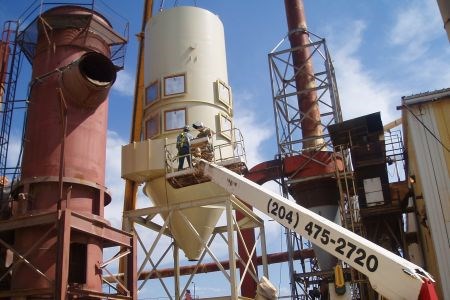A Thunder Bay businessman has received the first allotment of Crown fibre in the province's wood supply competition.
Ed Fukushima of Atikokan Renewable
Fuels is officially the first company out of the gate in accepting an
offer to access 279,000 cubic metres of poplar and birch annually
over the next 10 years to make wood pellets.
The Ministry of Northern Development,
Mines and Forestry made the announcement Jan. 31. The Northern
Ontario Heritage Fund is chipping in $1 million toward plant
renovations at the former FibraTech oriented strand board mill in
Atikokan which will grow out to be a $15-million operation.
Together with partner Larry Levchak,
Fukushima has been renovating the former Atikokan mill, 170
kilometres west of Thunder Bay, in anticipation of producing wood
pellets for Canadian and international clients by this year's third
quarter.
The operation will create 45 plant and
yard jobs, and employment for 60 in harvesting and hauling.
“The phone hasn't stopped ringing,”
said Fukushima of the incoming calls from laid-off area forestry
workers and Atikokan residents.
“We'll have a lot of automation,
but the skills we need are strictly people who want to work hard.”
The plan is to produce 140,000 tons of
European-standard, power-plant grade, pellet for the industrial,
commercial and residential markets. The company has struck an
agreement with Rainy Lake Tribal Contracting to do the complete fibre
hauling and handling.
The ratio of wood used to pellets
produced is roughly 2-to-1 based on a formula of a 50 per cent
moisture content. “If we get drier wood, we make more pellets,”
said Fukushima.
Fukushima said the operation is easily
expandable, adding there are plans in place to buy more wood on the
open market.
He was unable to talk about what forest
management unit he was drawing wood from, but it will be within 100
kilometres of the plant.
“Our main goal was to have an economical haul distance to keep the price of our product competitive.”
Fukushima said the next step is to
confirm that the fibre alloted is actually there before they sign
agreements with various stakeholders.
The operation involves putting round wood through a banded biomass grinder. Five pellet presses will each be capable of producing five tons per hour.
Fukushima will shortly be ordering the
equipment from a U.S. manufacturer, California Pellet Mill.
There will also be a 10-megawatt co-generation facility to heat the plant and for the driers once a provincial power purchase agreement is signed.
The Atikokan Renewable Fuels plant is
only 14 kilometres from Ontario Power Generation's (OPG) Atikokan
Generating Station, which is undergoing a multi-million dollar
conversion from burning coal to wood pellets.
Both sites are connected by road and
rail.
Despite the geographical advantages,
it's not a given that Fukushima's company will be the supplier of
choice. They have applied to OPG through a separate bidding process
but were told no decisions are being made until the province's wood
supply competition is complete.
If any case, Fukushima's company has
also been talking with potential customers ranging from big box
stores to European interests, from selling 50 pounds of pellets for
residual use, to shipping boatloads of fuel overseas for power
production.
“What Europeans now are interested in
is reliability of supply. The ministry allotment gives them that. If
we were based on sawmill residues, that's an unknown. The price still
has to be fair, but they're more interested in guaranteed sources of
supply.”
The Atikokan plant conversion has
created work for Fukushima's other companies in Thunder Bay – MGM
Electric, Mahan Electric and Automation Now – which are
refurbishing the plant's electrical systems, wood driers, and
installing new automation systems.
He's also a technical partner in a
Parks Falls, Wisc. business called Renewable Densified Fuels which
makes a biomass-based pellet with a waterproofing polyethylene
binder.
www.arfuels.ca




